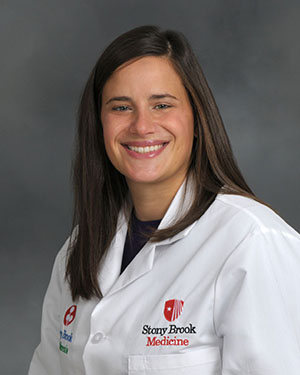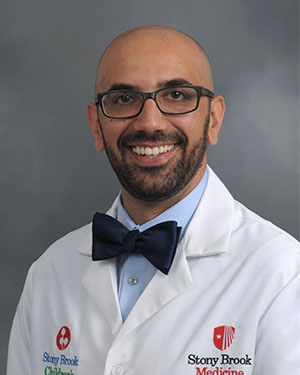Navigation Pediatric Urology
Pediatric Urology
The Division of Pediatric Urology at Stony Brook Children's Hospital is part of the renowned Stony Brook Department of Urology, offering specialized care for children with urinary and reproductive system conditions.
As a regional leader in pediatric urology, Stony Brook is the only hospital in Suffolk County to provide advanced procedures, including hypospadias repair, complex reconstructive surgery, and minimally invasive robotic surgery. In addition to treating complex cases, the division also addresses more common urologic conditions such as enuresis (bedwetting), voiding dysfunction, hernias, circumcision, and undescended testes.
Services
Stony Brook's Department of Pediatric Urology provides comprehensive care, featuring state-of-the-art diagnostics, advanced surgical techniques, and innovative treatment options. Our team specializes in the management of both common and complex urologic conditions for infants, children, teens, and young adults.
Stony Brook offers some of the most advanced diagnostic technologies on Long Island, all administered by skilled doctors and technologists who prioritize a child-friendly approach. Pediatric urology patients have access to a range of sophisticated tests, including nuclear scans, MRIs, and CT scans.
Additionally, the department regularly performs and interprets:
- Ultrasounds: A safe, non-invasive procedure that involves no radiation exposure, used to diagnose both acquired and congenital urologic conditions.
- Video-Urodynamics: A specialized test that measures bladder function in children with urinary incontinence and voiding dysfunction.
Whenever possible, Stony Brook Children's employs the most minimally invasive surgical techniques, which promote faster recovery, shorter hospital stays, and less trauma to the affected area.
Some of the urologic surgical procedures offered at Stony Brook include:
- Robot-assisted laparoscopic surgery: This advanced technology enables minimally invasive surgeries that were previously only possible through larger "open" incisions. It is most commonly used for robotic pyeloplasty and other kidney surgeries.
- Hypospadias repair: A reconstructive outpatient surgery, typically performed on infants between six months and one year, to correct a congenital abnormality of the penile opening. Stony Brook Children's is the only hospital in Suffolk County to perform this highly specialized procedure, with 40 to 50 cases annually.
- Repair of antenatal congenital abnormalities: Such as obstructive uropathy (e.g., congenital uretero-pelvic junction obstruction, primary obstructive megaloureter, vesicoureteral reflux, posterior urethral valves, duplicated systems and ureteroceles).
- Repair of complex genitourinary anomalies: Surgical correction of complex birth defects of the urinary and reproductive systems.
- Repair of hydroceles: A common condition in male infants where a fluid-filled sac surrounds the testicles, causing scrotal swelling.
- Laparoscopic or open hernia repair: Surgical intervention for hernias in infants, children and teens.
- Specialized emergency procedures: Such as surgery for acute torsion of the spermatic cord (twisted testicles).
- Newborn circumcision: Performed in the office.
- Circumcision or circumcision revision: For older boys and teenagers.
Pediatric Voiding Improvement Program (VIP)
Stony Brook's Pediatric Voiding Improvement Program (VIP) is Suffolk County's most comprehensive center dedicated to treating children and teenagers with bladder control issues.
We evaluate and treat a wide range of voiding dysfunctions, including bedwetting, urinary incontinence, prolonged urine holding, urinary frequency, and recurrent urinary tract infections. Treatment options include biofeedback using state-of-the-art Laborie Urostym® technology, specifically designed for pediatric use. Our goal is to treat voiding dysfunction in the most non-invasive, age-appropriate, and effective manner possible.
Our Team
Stony Brook Medicine's Pediatric Urology program offers comprehensive care, featuring state-of-the-art diagnostics, advanced surgical instrumentation, and innovative treatment for both common and complex urologic conditions. Our team consists of fellowship-trained, board-certified physicians dedicated to providing patient- and family-centered care for infants, children, adolescents, and young adults.
Given the multidisciplinary nature of pediatric urology, our urologists collaborate closely with other departments at Stony Brook Children's, including Pediatric Nephrology, General Pediatric Surgery, Pediatric Neurosurgery, Pediatric Radiology, and the Pediatric Emergency Department.
Locations
Commack Advanced Pediatric Care
500 Commack Road, Suite 104Commack, NY 11725
(631) 444-KIDS (5437)
Fax: (631) 638-0157
Patchogue Advanced Pediatric Care
450 Waverly AvenuePatchogue, NY 11722
(631) 444-KIDS (5437)
Fax: (631) 444-6327
Smithtown Advanced Pediatric Care
260 Middle Country Road, Suite 107Smithtown, NY 11787
(631) 444-KIDS (5437)
Fax: (631) 265-7518
Stony Brook Life Care Center
225 West Montauk HighwayHampton Bays, NY 11946
For appointments: (631) 444-6270 Option 2
Stony Brook Urology Holbrook
280 Union AvenueHolbrook, NY 11741
For appointments: (631) 444-6270 Option 2
Stony Brook Urology Riverhead
74 Commerce DriveRiverhead, NY 11901
For appointments: (631) 444-6270 Option 2
Research and Education
As part of Suffolk County's only academic medical center, Stony Brook Children's is committed to training the next generation of physicians. Each year, a group of residents rotates through the Department of Pediatric Urology, not only gaining valuable experience in state-of-the-art medicine, but also continually infusing the program with the latest ideas and approaches.
The Department is also committed to advancing the field of pediatric urology by participating in bench and clinical research. Our team is actively involved in a number of ongoing research projects and continues to publish and present their results at national and international meetings. Additionally, our team of physicians are the core faculty members of the only Urology Resident training program in Suffolk County.
Advances and Recognition
- Newsday & Castle Connolly: Top Doctors on Long Island (2008, 2010-2023)
- Top Doctors in New York Metro Area (2016-2020)
- Reviewer of the Journal of Pediatric Urology
- Fellow of the American Academy of Pediatrics
- Fellow of the American College of Surgeons
- Member of the American Urological Association (AUA)
- Member of the Societies for Pediatric Urology (SPU)
- Journal of Urology: Top Social Media Presence Supporting AUA Voice of Urology (2023)
- Alpha Omega Alpha Medical Honor Society (2019)\Gold Humanism Honor Society (2018)
- AUA Earl Nation Retrospectroscope Award, William P. Didusch Center for Urologic History
- Member of the American Urological Association (AUA)
- Member of the Societies for Pediatric Urology (SPU)
- Member of the American Association of Pediatrics (AAP)
- Serves on the Membership Committee for the AAP Section on Urology
- Previously Served as Chair of the Residents and Fellows Committee for the AUA
- Member of the American Urological Association (AUA)
- Member of the Societies for Pediatric Urology (SPU)
- Urologic Representative at Stony Brook University for the Diversity, Inclusion, and Equity CommitteeUrologic
- Representative on the Pediatric CAUTI Prevention Committee



